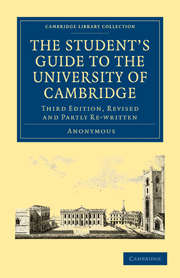Book contents
- Frontmatter
- PREFACE TO FIRST EDITION
- PREFACE
- Contents
- INTRODUCTION
- University and College Expenses
- The Mathematical Tripos
- The Classical Tripos
- The Moral Sciences Tripos
- The Natural Sciences Tripos
- On the Study of Law
- Degrees in Medicine and Surgery
- On Preparation for the Theological Examinations
- The Ordinary or Poll Degree
- University of Cambridge Local Examinations
- The Oriental Triposes
- The Historical Tripos
- Non-Collegiate Students
- Detailed Account of the several Colleges
On Preparation for the Theological Examinations
Published online by Cambridge University Press: 29 August 2010
- Frontmatter
- PREFACE TO FIRST EDITION
- PREFACE
- Contents
- INTRODUCTION
- University and College Expenses
- The Mathematical Tripos
- The Classical Tripos
- The Moral Sciences Tripos
- The Natural Sciences Tripos
- On the Study of Law
- Degrees in Medicine and Surgery
- On Preparation for the Theological Examinations
- The Ordinary or Poll Degree
- University of Cambridge Local Examinations
- The Oriental Triposes
- The Historical Tripos
- Non-Collegiate Students
- Detailed Account of the several Colleges
Summary
THE THEOLOGICAL EXAMINATIONS.
There are at present two “Theological Examinations” established by the University : The Special Theological Examination (1), and The Theological Tripos (2). To these must be added a third Examination which has been organized by members of the Theological Faculty to meet the wants of Candidates for Holy Orders (3).
THE SPECIAL THEOLOGICAL EXAMINATION.
The Special Theological Examination is one of the Special Examinations for the B.A. degree (Introd. p. 22). The subjects of Examination are
(1) Selected Books of the Old Testament in the English Version.
(2) One of the Four Gospels in the original Greek.
(3) Two at least of the Epistles of the New Testament in the original Greek.
(4) The History of the Church of England to the Revolution of 1688.
A paper is also set in a selected portion of the Old Testament in Hebrew. For this paper students are not required to present themselves, but the result of it is taken into account in arranging the Class List; and marks of distinction are affixed to the names of those who acquit themselves with credit.
The selected subjects for each Examination are announced by the Theological Board about a year before the Examination.
The names of those who pass the Examination are arranged in two classes : the names in the first class being arranged in order of merit, and those in the second class alphabetically.
- Type
- Chapter
- Information
- The Student's Guide to the University of Cambridge , pp. 298 - 338Publisher: Cambridge University PressPrint publication year: 2009First published in: 1874



